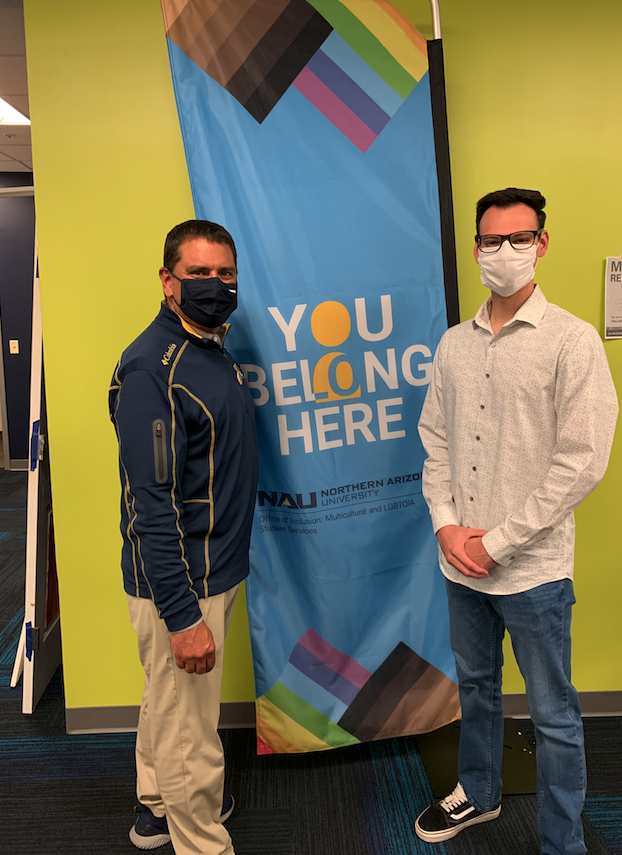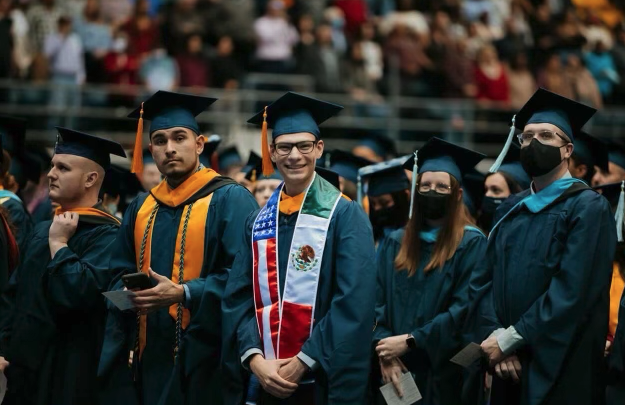Oscar Lujan is the first member of his family to pursue a degree in higher education.
When Lujan received the Lumberjack Scholarship in 2015, he decided to take the first step of his college career by moving away from his hometown of Phoenix to Flagstaff. Upon his arrival, he joined the Successful Transition and Academic Readiness (STAR) program.
“I had no idea what to expect from college, especially at the university level,” he said. “Not only did the STAR program connect me with other students who were facing similar concerns, but I felt confident in myself that I could be the first in my family to complete a college degree.”
During Lujan’s freshman year, he was accepted into the Initiative for Maximizing Student Diversity (IMSD) program—a program funded by the National Institutes of Health that allows undergraduate students from underrepresented backgrounds to work in a lab while getting paid. Lujan applied to join the Tissue Engineering and Regenerative Medicine (TERM) lab run by Robert Kellar, associate professor of practice in the Department of Biological Sciences.
“I had a high school background in science and no laboratory experience, yet Dr. Kellar took a chance on me and allowed me to join his lab,” Lujan said.
He spent the next three-and-a-half years working in the TERM lab performing research around wound healing impacts from heavy metals commonly found in well water. He not only gained experience in a laboratory setting but was able to present his research at various conferences.
In 2018, Lujan was chosen to participate in a Minority Health and Health Disparities International Research Training (MHIRT) program, once again funded by the National Institutes of Health. He spent two months in Los Baños, the Philippines, where he researched the molecular defense mechanisms in rice plants after exposure to common bacterial threats at the International Rice Research Institute. When he wasn’t in the lab, he was exploring the Philippines with two other MHIRT participants.
“After participating in the MHIRT program, I realized how research conducted in a laboratory directly translates to those being impacted by health disparities,” Lujan said.
After returning from the Philippines, Lujan returned to NAU. Here, a colleague from the Center for International Education asked if he could speak to the Latinx Student Union (LSU) about his time in the Philippines. An opportunity to share his research and experience in a country he had grown to love? Lujan jumped at the chance.
“Throughout my first few years at NAU, I felt homesick from the lack of a familiar culture,” he said. “I went to one of the LSU club meetings and instantly knew this club had everything I had been looking for.”
Lujan soon became a registered member of the LSU, regularly attending meetings, volunteering at events and becoming part of the Latinx community on campus. Soon thereafter, he ran for a position on the officer board and was elected to serve as the community engagement officer where he researched factors that impact the Latinx community.
In 2019, the LSU was at risk of becoming inactive due to various complications. By this time, Lujan had finished his undergraduate degree and started his master’s in biology at NAU. He decided that in order to keep the LSU an active organization on campus, he would have to become the graduate adviser for the club.
“After two years of reorganizing and leading the group, LSU is now a prominent organization and provides a community where members feel like a familia,” he said.

“Vidal and I had spent a great amount of time planning events for the 2021 Hispanic Heritage Month celebration and we decided to ask President Cruz Rivera if he would be interested in joining us for a question and answer session,” he said. “It felt like everything I had been working on to support the Latinx community led to this exact moment —directly talking to and interviewing the president of NAU.”
After Lujan’s graduation, he plans to move back to Phoenix. He wants to find a position in science and research to gain more industry experience before pursuing a Ph.D.
“I plan to continue helping the Latinx community when I return home by volunteering at local organizations. I also want to mentor underrepresented students who are interested in pursuing higher education, whether it be at the high school or community college level.”





